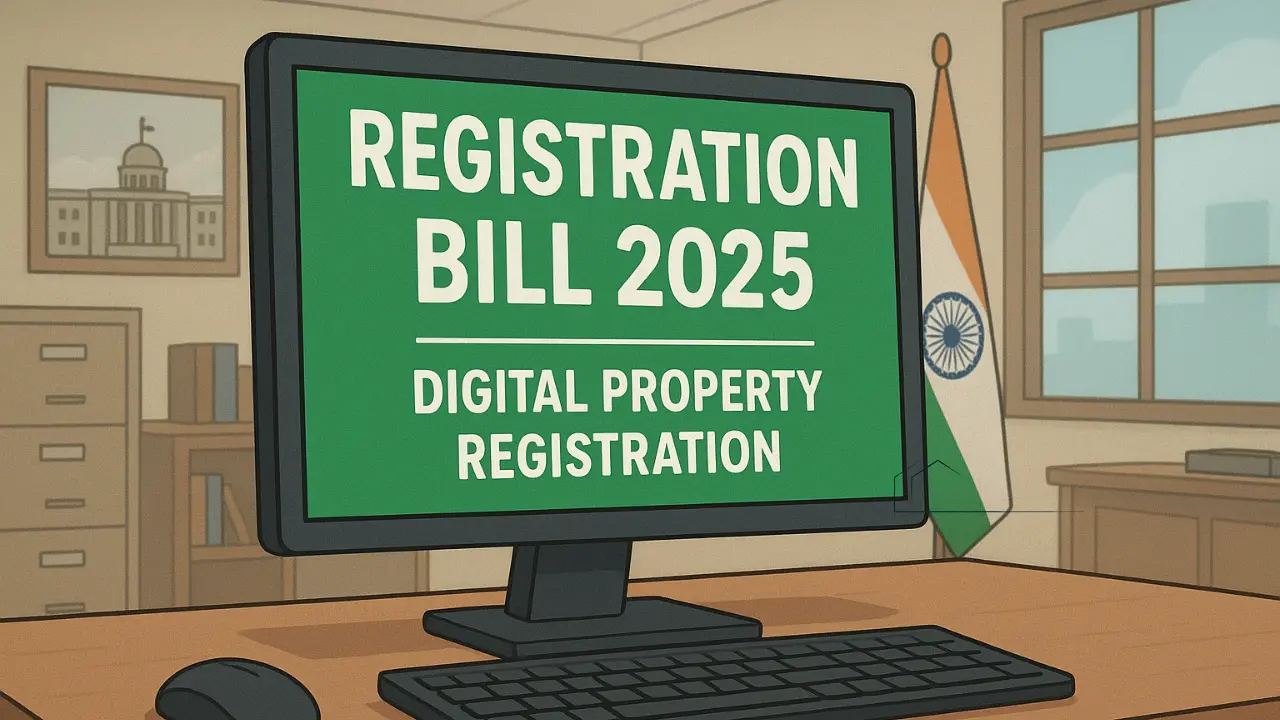Registration Bill 2025: All About Digital Property Registration

In a groundbreaking move, the Central Government has introduced the Registration Bill 2025, a reformative legislation that seeks to modernize and digitize India’s property registration system. This new bill is set to replace the century-old Registration Act of 1908, making way for a seamless, transparent, and tech-enabled property transaction ecosystem.
The proposed law introduces digital workflows, Aadhaar-based verification, online documentation, and a centralized e-registry—all designed to promote transparency, curb property fraud, and put an end to benami transactions. It aligns perfectly with the Government’s Digital India and Ease of Doing Business initiatives, redefining how property ownership is recorded in the country.
What is the Registration Bill 2025?
The Registration Bill 2025 is a proposed law that introduces an online-first, digital property registration process. It aims to remove manual bottlenecks, reduce fraudulent transactions, and create a citizen-centric, paperless registration system accessible to all—whether in metro cities or remote villages.
This reform will also directly address the menace of benami transactions by ensuring that every property registration is digitally verified and legally traceable through Aadhaar and PAN-based authentication.
Key Objective of the Bill
The main objective of the Registration Bill 2025 is to digitally empower property owners and buyers while improving the transparency, efficiency, and accountability of property transactions.
Primary Goals:
- Introduce a paperless, online registration mechanism
- Enhance public trust in property records
- Enable real-time verification to curb fraudulent sales
- Make property ownership records accessible and traceable
- Support the government’s Digital India and Ease of Doing Business agenda
Key Features of the Draft Registration Bill 2025
1. Complete Online Registration Process
The proposed bill allows the entire property registration cycle—from document submission to issuance of certificates—to be completed online.
Key Components:
- Electronic submission of property documents
- Aadhaar-based or alternate identity verification
- Online payment of stamp duty and registration fees
- Digital issuance of registration certificates
Physical visits to the sub-registrar’s office will be required only in exceptional cases involving verification or suspected discrepancies.
2. Expansion of Compulsorily Registerable Documents
The new law broadens the scope of documents that must be registered, ensuring transparency and reducing disputes.
Newly Included Documents:
- Agreements to Sell
- Powers of Attorney (PoA)
- Sale Certificates from recognized authorities
- Equitable Mortgage Deeds
- Judicial Instruments and legal orders
By mandating registration for these documents, the bill strengthens due diligence, safeguards ownership, and prevents property-related litigations.
3. Aadhaar-Based and Alternative Authentication
The bill emphasizes Aadhaar-enabled authentication, but also respects privacy and inclusivity by allowing alternative verification methods.
Authentication Options:
- Aadhaar authentication (voluntary & consent-based)
- Offline Aadhaar verification
- Passport or Voter ID for non-Aadhaar users
This ensures compliance with Supreme Court rulings on Aadhaar privacy, while maintaining flexibility for all citizens.
4. Biometric and Paperless Verification
To prevent fraud and impersonation, property registrations will include:
- Biometric thumb impressions
- E-signatures
- Passport-size photographs
- PAN card verification
These measures strengthen document authenticity and boost legal evidentiary value.
5. Hybrid Approach for Exceptional Cases
While the process is digital-first, physical verification may still be required in cases involving:
- Suspected fraud or forgery
- Incomplete or suspicious data
- Cases of public interest
This hybrid model ensures a balance between convenience and security.
6. Modernized Administrative Structure
The bill introduces a revamped administrative hierarchy to manage digital property records efficiently.
Proposed Roles:
- Inspector General of Registration
- Additional/Assistant IGs
- Digital Registrars
- Technical Officers (for IT and database management)
This framework promotes accountability, technical expertise, and faster dispute resolution.
7. Integration with Government Databases
The bill mandates real-time integration with multiple national and state databases, including:
- Land Records Systems (Bhoomi, Bhulekh, etc.)
- Income Tax Database (via PAN)
- UIDAI Database (Aadhaar verification)
- Municipal Property Tax Records
Such interoperability will help identify duplicate registrations, illegal land use, and benami properties, ensuring greater transparency.
8. E-Registry and Real-Time Record Maintenance
The creation of a centralized digital E-Registry is one of the bill’s biggest highlights.
Features:
- Cloud-based data storage
- Real-time ownership updates
- QR-coded registration certificates
- Public and institutional access for verification
This system will make property verification faster, aiding banks, NBFCs, homebuyers, and courts during due diligence and legal proceedings.
9. Dispute Resolution & Appeals Mechanism
The bill also ensures a transparent grievance redressal process. If registration is:
- Denied,
- Incorrectly recorded, or
- Based on fraudulent documents,
citizens can appeal to appellate officers or registration tribunals for swift resolution. This ensures accountability within the registration framework.
Why Replacing the 1908 Act is Crucial
The Registration Act of 1908 was created for a paper-based, colonial-era system. It lacks provisions for:
- Digital governance
- Biometric verification
- Real-time updates
- Integration with online databases
Replacing it with the Registration Bill 2025 is a long-overdue modernization step that aligns India’s property registration laws with global digital governance standards.
How the Bill Impacts Different Stakeholders
| Stakeholder | Impact |
|---|---|
| Homebuyers | Faster online registration and safer ownership records |
| Sellers | No need for multiple physical visits or manual documentation |
| Banks/NBFCs | Real-time verification for faster loan approvals |
| Legal Professionals | Reduced disputes and simplified due diligence |
| NRIs & Elderly | Remote registration capabilities from anywhere |
Old vs. New: Comparing the 1908 Act and the 2025 Bill
| Feature | Registration Act, 1908 | Registration Bill, 2025 |
|---|---|---|
| Process | Manual & physical | Fully digital & online |
| Identity Verification | Not mandatory | Aadhaar/Biometric-based |
| E-Signature | Not recognized | Legally valid |
| Record Storage | Physical ledgers | Cloud-based registry |
| Fraud Detection | Limited | Real-time verification |
| System Integration | Isolated | Linked to multiple databases |





